Gravity Recovery and Climate Experiment (GRACE)
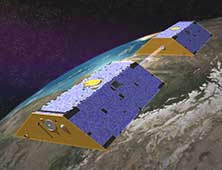 The twin-spacecraft Gravity Recovery and Climate Experiment (GRACE) mission measures changes in the Earth’s gravity with unprecedented accuracy, providing crucial information about the distribution and transport of mass within the Earth system’s surface and deep ocean currents, surface and ground water storage, ice sheets and glaciers, and other hydrological and terrestrial features.
The twin-spacecraft Gravity Recovery and Climate Experiment (GRACE) mission measures changes in the Earth’s gravity with unprecedented accuracy, providing crucial information about the distribution and transport of mass within the Earth system’s surface and deep ocean currents, surface and ground water storage, ice sheets and glaciers, and other hydrological and terrestrial features.
Gravity Recovery and Climate Experiment Follow-On (GRACE-FO)
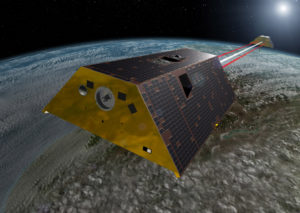 Since its launch in May 2018, the GRACE-FO mission has continued the measurement of variations in the Earth’s gravity field, and is providing datasets that enable scientists to develop an even deeper understanding of long-term global climate processes. The new and innovative Laser Ranging Interferometer technology has been successfully demonstrated, and provides high quality measurements.
Since its launch in May 2018, the GRACE-FO mission has continued the measurement of variations in the Earth’s gravity field, and is providing datasets that enable scientists to develop an even deeper understanding of long-term global climate processes. The new and innovative Laser Ranging Interferometer technology has been successfully demonstrated, and provides high quality measurements.
Ice, Cloud, and Land Elevation Satellite 2 (ICESat-2)
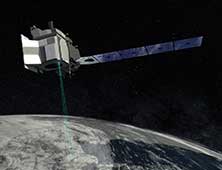 Scheduled for launch in 2018, the ICESat-2 spacecraft is a photon-counting laser altimeter satellite that will continue the original ICESat mission’s detailed global measurement of changes over time in ice sheet, sea ice, forest canopy, and global land and ocean surface heights. CSR supports the Precision Orbit and Pointing Determination (POD, PPD) tasks that are critical for accurate and precise geolocation of the laser.
Scheduled for launch in 2018, the ICESat-2 spacecraft is a photon-counting laser altimeter satellite that will continue the original ICESat mission’s detailed global measurement of changes over time in ice sheet, sea ice, forest canopy, and global land and ocean surface heights. CSR supports the Precision Orbit and Pointing Determination (POD, PPD) tasks that are critical for accurate and precise geolocation of the laser.
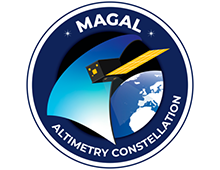 MAGAL
MAGAL
Once launched, MAGAL will be a constellation of 6 identical Cubesats, each equipped with an Earth-observing radar altimeter. By flying in close proximity one after the other, MAGAL will improve on a global scale temporal sampling from 10 to 5 days of regional and local variations in sea surface topography, ocean eddy detection and tracking, and inland water levels. This will enable enhanced marine debris monitoring, near-term water conditions for fisheries and other ocean-faring operations, and more precise data for natural disaster response. MAGAL is funded by the UT Austin Portugal Program.
uPGRADE
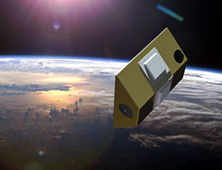 uPGRADE is an Earth Observation Cubesat for observing Earth’s gravitational field variations and measuring the neutral thermosphere. The University of Texas at Austin will evaluate the scientific capabilities of satellite, equipped with a GNSS receiver, MEMS accelerometer and Star-trackers, in cooperation with a consortium of Portuguese commercial and academic institutions, comprised of Spin.Works, University of Minho, the International Iberian Nanotechnology Laboratory (INL) and the Institute of Welding and Quality (ISQ), funded by the UT Austin-Portugal Program.
uPGRADE is an Earth Observation Cubesat for observing Earth’s gravitational field variations and measuring the neutral thermosphere. The University of Texas at Austin will evaluate the scientific capabilities of satellite, equipped with a GNSS receiver, MEMS accelerometer and Star-trackers, in cooperation with a consortium of Portuguese commercial and academic institutions, comprised of Spin.Works, University of Minho, the International Iberian Nanotechnology Laboratory (INL) and the Institute of Welding and Quality (ISQ), funded by the UT Austin-Portugal Program.
